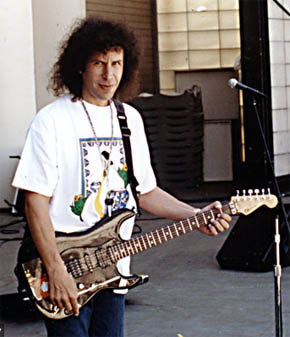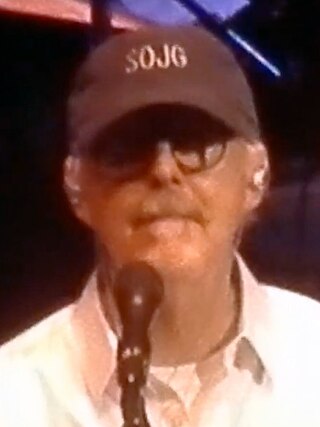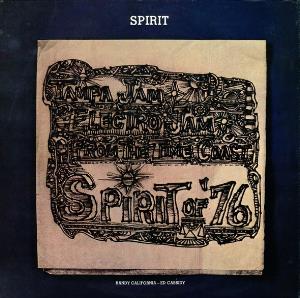
The Delfonics were an American R&B/soul vocal group from Philadelphia. The Delfonics were most popular in the late 1960s and early 1970s. Their most notable hits include "La-La ", "Didn't I ", "Break Your Promise", "I'm Sorry", and "Ready or Not Here I Come ". Their hit songs were primarily written by lead vocalist and founding member William "Poogie" Hart, and arranger and producer Thom Bell. Wilbert Hart is the last surviving founding member.

Cocteau Twins were a Scottish rock band active from 1979 to 1997. They were formed in Grangemouth on the Firth of Forth by Robin Guthrie and Will Heggie (bass), adding Elizabeth Fraser (vocals) in 1981. In 1983, Heggie was replaced with multi-instrumentalist Simon Raymonde. The group earned critical praise for their ethereal, effects-laden sound and the soprano vocals of Fraser, whose lyrics often eschew any recognisable language. They pioneered the 1980s alternative subgenre of dream pop and helped define what would become shoegaze.

Barret Eugene Hansen, known professionally as Dr. Demento, is an American radio broadcaster and record collector specializing in novelty songs, comedy, and strange or unusual recordings dating from the early days of phonograph records to the present. Hansen created the Demento persona in 1970 while working at the Pasadena, California, station KPPC-FM. After he once played "Transfusion" by Nervous Norvus on the radio, DJ "The Obscene" Steven Clean said that Hansen had to be "demented" to play it; this event inspired his stage name. His weekly show went into syndication in 1974 and was syndicated by the Westwood One Radio Network from 1978 to 1992. Broadcast syndication of the show ended on June 6, 2010, but the show continues to be produced weekly in an online version.

Information Society is an American electronic band from Minneapolis–St. Paul, Minnesota, initially active from 1982 to 1997, primarily consisting of Kurt Harland Larson, Paul Robb, and James Cassidy; the latter two reconvened the band in 2006, initially with Christopher Anton as lead vocalist, then with Harland rejoining them as lead vocalist by 2008.

Spirit was an American rock band founded in 1967 and based in Los Angeles. Their most commercially successful single in the United States was "I Got a Line on You". They were also known for their albums, including their self-titled debut album, The Family That Plays Together, Clear, and Twelve Dreams of Dr. Sardonicus.

"Weird Al" Yankovic is the debut studio album by the American parody musician "Weird Al" Yankovic. The album was the first of many produced by former The McCoys guitarist Rick Derringer. Mostly recorded in March 1982, the album was released by Rock 'n Roll Records as an LP and on Compact Cassette in 1983.

"Oh, My Darling Clementine" is a traditional American, tragic but sometimes comic, Western folk ballad in trochaic meter usually credited to Percy Montross (1884), although it is sometimes credited to Barker Bradford.

Randy Craig Wolfe, known as Randy California, was an American guitarist, singer and songwriter, and one of the original members of the rock group Spirit, formed in 1967.

Michael Franks is an American singer and songwriter, considered a leader of the quiet storm movement. He has recorded with a variety of well-known artists, such as Patti Austin, Art Garfunkel, Brenda Russell, Claus Ogerman, Joe Sample, and David Sanborn. His songs have been recorded by Gordon Haskell, Shirley Bassey, The Carpenters, Kurt Elling, Diana Krall, Patti LaBelle, Lyle Lovett, The Manhattan Transfer, Leo Sidran, Veronica Nunn, Carmen McRae, Ringo Starr and Natalie Cole.

Quark, Strangeness and Charm is the seventh studio album by the English space rock group Hawkwind, released in 1977. It spent six weeks on the UK Albums Chart peaking at number 30.

Spirit of '76, released in May 1975, was the first of four albums that Spirit would (initially) release for Mercury Records, and their sixth album overall. Though all four albums were greatly influenced by the time that Randy California spent living in Hawaii, this album bears that influence more than any of the others. Though it was largely ignored upon its first release, many fans consider it to be one of Spirit's best albums.

Son of Spirit was the second album that Spirit released through Mercury Records, and their seventh album overall. It was released in October 1975. Unlike Spirit of '76, however, it did not make the national charts.

Farther Along was the third album that Spirit released through Mercury Records, and their eighth album overall. Though Jay Ferguson was missing from the lineup, it is generally considered to be their first "reunion" album.

The Thirteenth Dream was the second "reunion" album from Spirit, and their eleventh album overall. It features re-recordings of seven of their best-loved tracks, along with three new songs. The most noteworthy things that can be said about the album are in regard to the excellent fidelity of the album, as it was originally recorded by an audiophile label and is an early digital recording, and that it was the first Spirit album to be released on CD, as it appeared in that format from Mercury Records in West Germany in 1984.

Call of the Wild is the fifth studio album by The Amboy Dukes, credited as "Ted Nugent & The Amboy Dukes", released in 1973.

"Take It to the Limit" is a song by Eagles from their fourth album One of These Nights from which it was issued as the last third single on November 15, 1975. It reached No. 4 on the U.S. Billboard Hot 100 and was also Eagles' greatest success to that point in the United Kingdom, going to No. 12 on the charts. Billboard ranked it as the No. 25 song for 1976.
The Firm was a British music act, formed by guitarist, session musician and music producer John O'Connor, which had hits in the 1980s with novelty songs.

Kapt. Kopter and the (Fabulous) Twirly Birds is a 1972 studio album by Randy California.

The Adventures of Kaptain Kopter & Commander Cassidy in Potato Land was originally recorded by Randy California and Ed Cassidy during the 1972/73 hiatus period of Spirit. A concept album of sorts, interspersed with dialogue, its original scheduled release in May 1973 was cancelled by Epic Records. It was eventually released in an abridged form in 1981, with the first half as new recordings and the second comprising original recordings remixed with overdubs. A reworked and fuller version, still somewhat erroneously credited to Spirit, was released in 2006 and remains available as The Original Potato Land.
"Silly" is a song written by Fritz Baskett, Clarence McDonald and Deniece Williams and performed by Williams. The soulful ballad was released off Williams' My Melody album in 1981 and became the most successful track off the album reaching as high as number fifty-three on the Billboard Hot 100 becoming an even bigger success on the R&B chart where it peaked at number eleven. It has since gone on to become one of Williams' most requested songs over a career that has spanned over thirty years. The song featured production by Williams and respected Philly soul producer Thom Bell. The song was recorded at Philadelphia's acclaimed Sigma Sound Studios. The song would be later covered by singer Taral Hicks nearly two decades later in 1997 and was released as the second single off Hicks' debut album becoming a hit on the R&B chart.



















